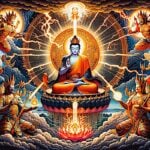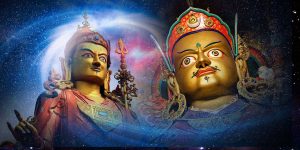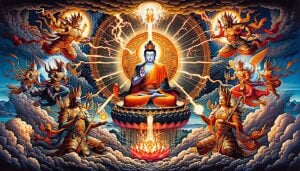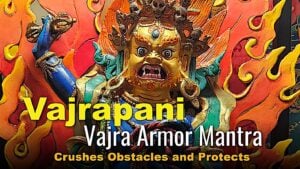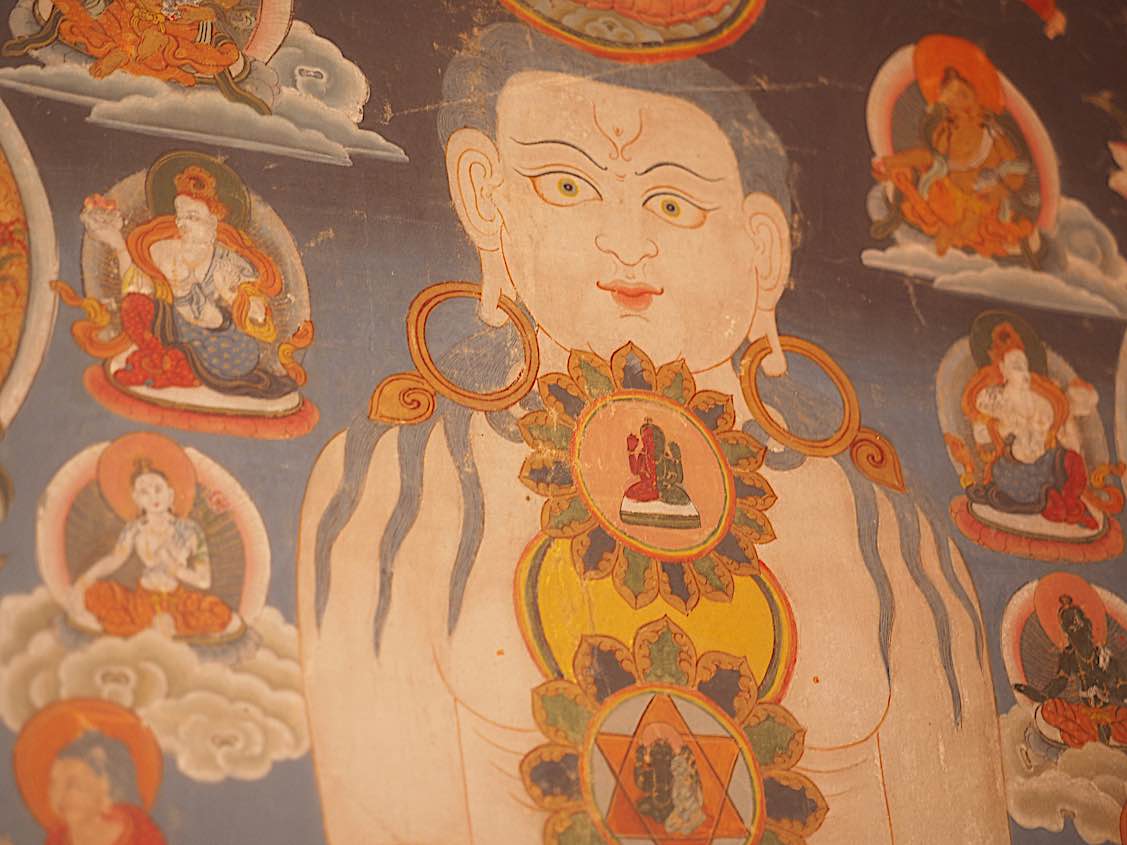Four heroic incarnations of Ksitigarbha, the “Earth Store” Bodhisattva — unfailing, never-tiring compassion
Ksitigarbha is a bodhisattva revered by millions across East Asia — honoured by the Buddha Himself due to his “untiring limitless compassion” — and his vows to help all sentient beings. He is also popularly known as Lord Jizo (Gizo).
By Eddie Sobenes
(Bio at bottom of feature)
In this feature, we explore the four previous incarnations of the bodhisattva, as was spoken by the Buddha in The Sutra of the Vows of Ksitigarbha Bodhisattva[1].
Many eons ago, the son of a respected elder worshiped the Buddha of his time, called Simhavikriditah Tathagata[2]. Impressed by the dignity and solemnity of that Buddha, the elder’s son thought and prayed, “How I wish I could be as solemn and elegant as this Buddha!”
“You must save all suffering sentient beings”
The Buddha of that epoch spoke to the elder’s son and said “If you want to be as solemn and dignified as I, you must save all suffering sentient beings.”
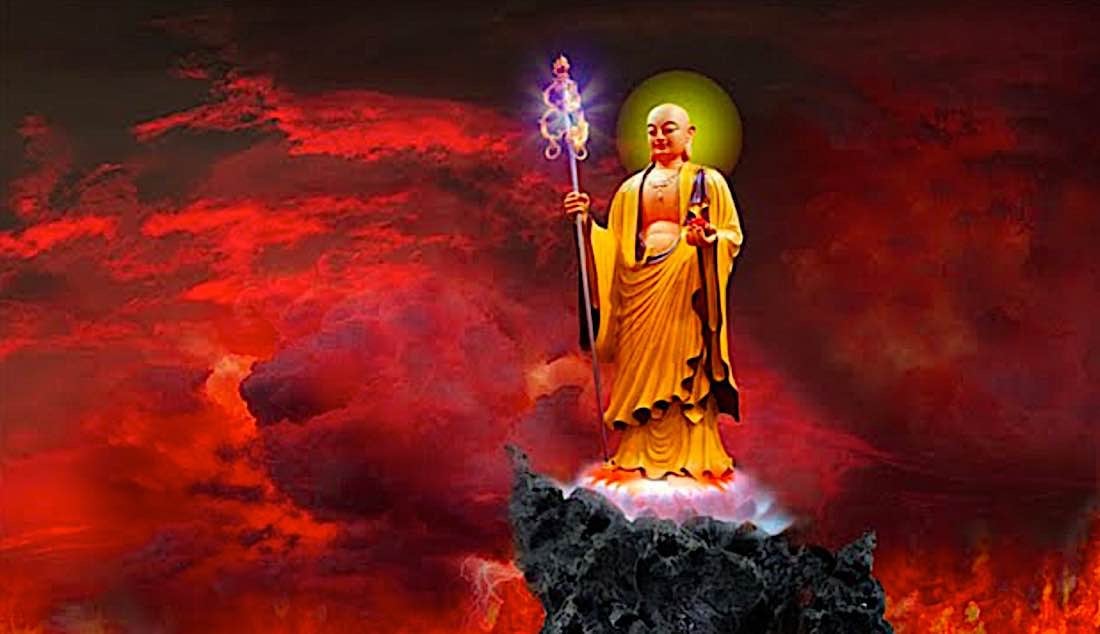
Upon hearing the voice of the Buddha, the elder’s son made a great vow,
“I vow to rescue all suffering sentient beings across uncountable eons and the six paths[3] of samsara[4] by establishing convenient methods. When all have been saved, only then will I attain Buddhahood.”
And again, many eons ago, in the epoch of Buddha Padma Samadhi Svara Raja Tathagata[5], there lived a virtuous Brahman girl. The girl’s mother held strange beliefs and disrespected the Three Jewels[6]. The Brahman girl tried to encourage her mother to adopt correct views, but to no avail. Upon the mother’s death, the Brahman girl became gravely concerned that her mother may have been reborn in an unfortunate realm. Seeking solace, she went to a temple to and made offerings before an image of the Tathagata.
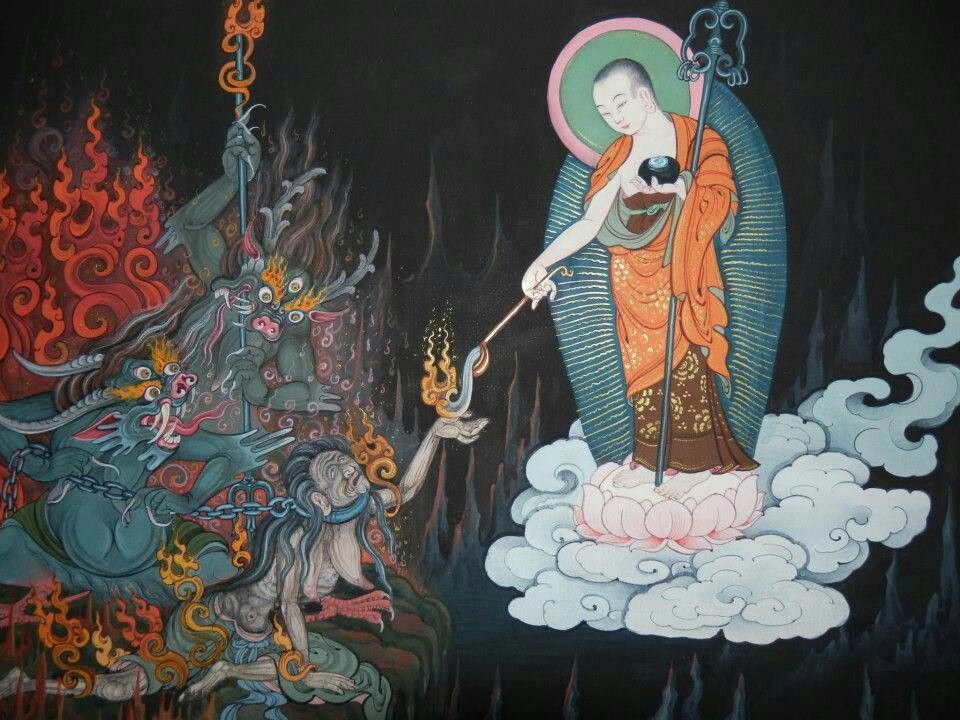
While in tears, praying reverently, she heard a voice from the sky, “Saintly girl, don’t be sad, I will tell you where your mother has gone.”
“Who are you?” The Brahman girl asked.
“I am Buddha Padma Samadhi Svara Raja Tathgata. Due to your exceptional devotion, I will show you your mother’s whereabouts. Once you have made your offerings, return home and contemplate my name.”
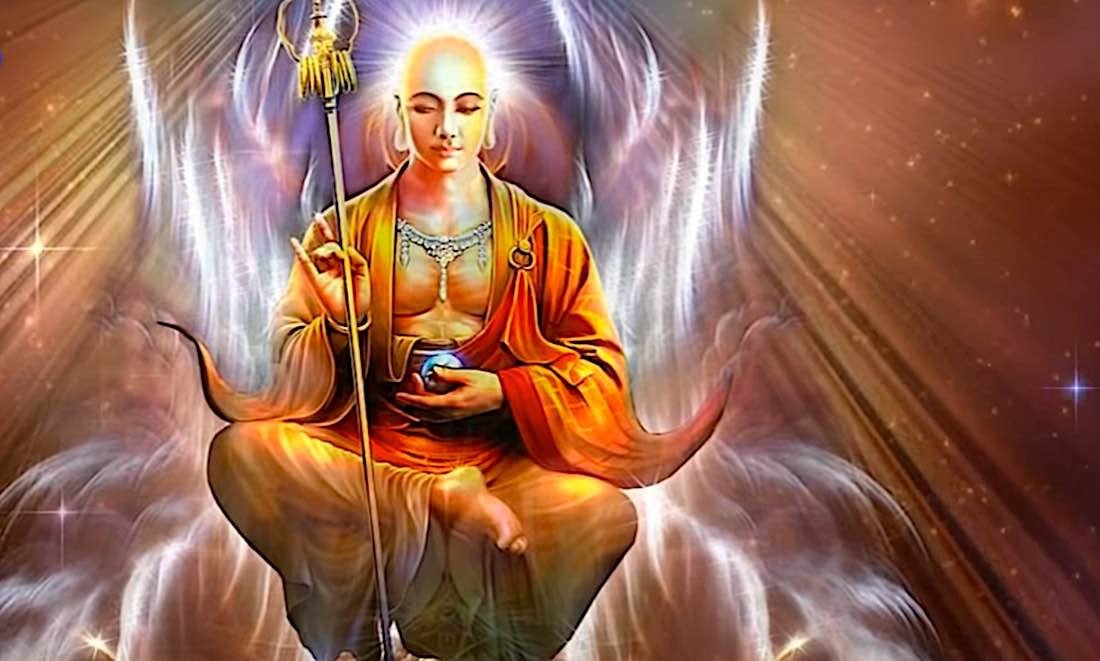
Mother saved from hell realm
The Brahman girl meditated on that Buddha for one day and one night. She saw herself coming to a boiling sea with many terrible looking demons[7]. Men and women were being cooked in the water while iron beasts clawed and tortured them. The Brahman girl remained calm and unafraid.
While there, she encountered a ghost king named Vandana[8] and who asked her, “Holy girl, why have you come here?”
“I have come in search of my mother,” said the Brahman girl, “What is this place?”
“This is Cakravada Parvata[9],” said Vandana, “One only comes here through karmic debt or spiritual power.”
Vandana told the Brahman girl about the different hells in the four directions; the eighteen major hells and five hundred minor ones, all with boundless suffering.
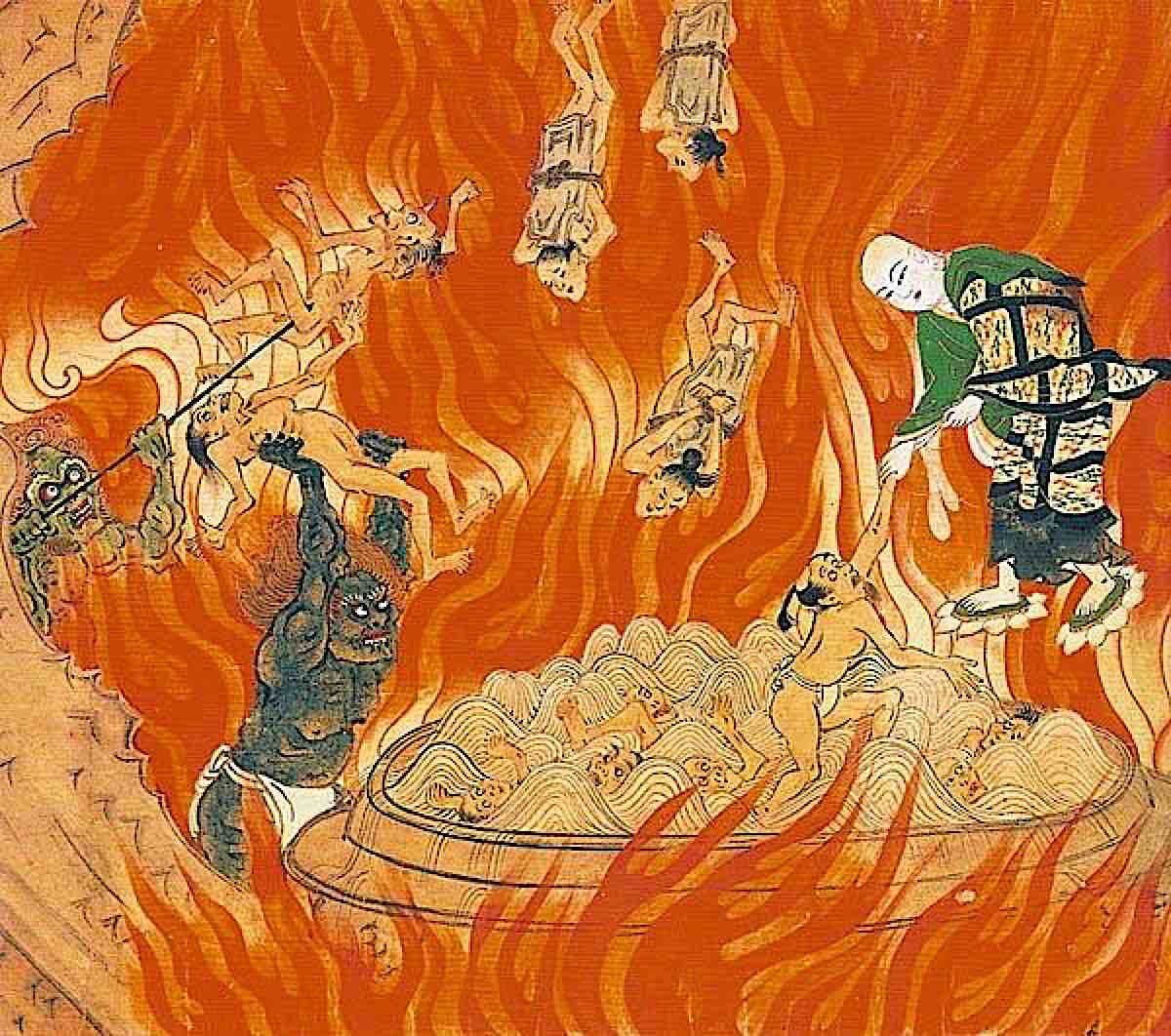
Vandana said,
“Because of your sincere offering to Buddha Padma Samadhi Svara Raja Tathagata, not only was your mother delivered from this hell realm, but so were all the other beings in her particular region.”
The Brahman girl awoke from her meditative dream and made a vow in front of an image of the Buddha,
“For an inexhaustible number of eons to come, I will establish expediencies to liberate and deliver sinful, suffering beings.”
This account took place eons ago. Vandana, the demon king, is now a bodhisattva called Dharasri[10], and the Brahman girl is now Ksitigarbha Bodhisattva.
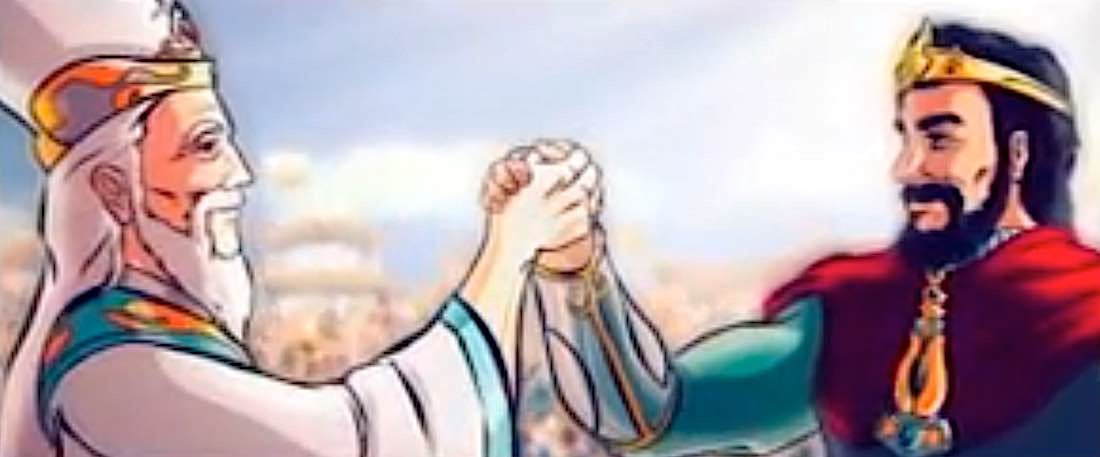
The two kings save the suffering people
Again, many eons ago, there was a Buddha named Sarvajnasiddharta Tathagata[11]. Before becoming a monk, he was the king of a small country. He was friendly with the king of a neighboring country and they both practiced the ten virtuous deeds[12]. Many of the people in this neighboring country committed sinful acts, so the two kings contrived a plan to correct their faults and deliver them from their evil ways.
An animated video story of the Two Kings (English subtitles):
The first king vowed to achieve Buddhahood quickly, in order to save the sinful people. The other king vowed not to become a Buddha until he has first liberated and delivered all those sinful, suffering beings. The king who vowed to achieve buddhahood quickly became Sarvajnasiddharta Tathagata. The other, who vowed to save all others first, is now Ksitigarbha Bodhisattva.
Vow to save suffering beings for millions of eons
And again, many eons ago, during the generation of the Buddha named Visuddhipandarikackshu Tathagata[13], there was a woman named Prabhacaksuh[14], who used to provide food to an arhat. One day, Prabhacaksuh told the arhat about her recently deceased mother and wanted to know her whereabouts.
The arhat entered a deep meditation to discover the mother’s whereabouts. He found out that she had followed an evil path and was now suffering. Prabhacaksuh asked what she could do to save her mother, and the arhat replied, “You must wholeheartedly recite the name of Visuddhipandarikacaksuh Tathagata, and mold and paint his image.”
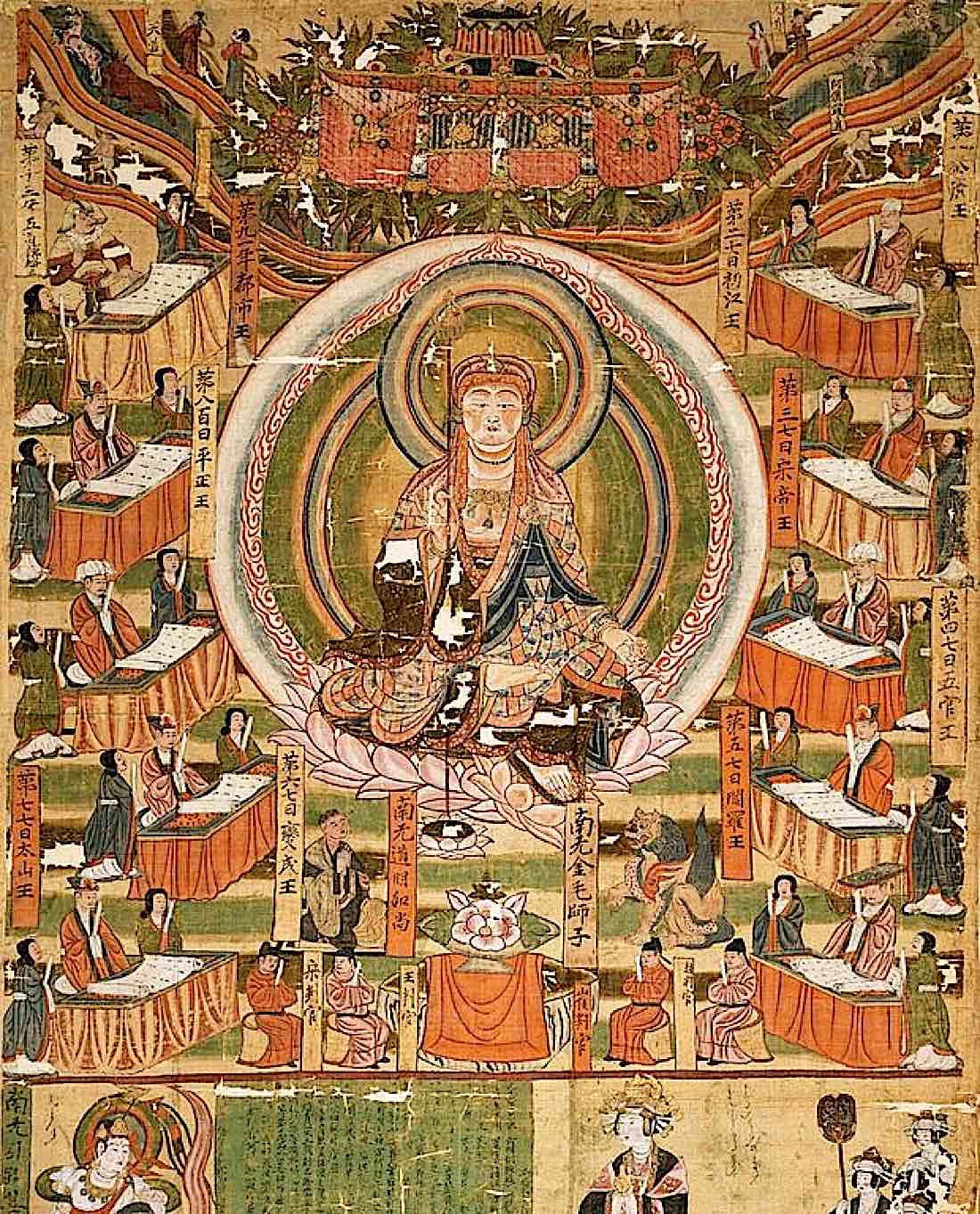
Prabhacaksuh commissioned a painting of the Tathagata and respectfully made offerings before it. That night, she dreamed of the Buddha emitting light and he told her, “Your mother will soon be reborn into your household, but after age 13, she will again fall onto an evil path[15].”
Soon after, Prabhacaksuh’s housemaid gave birth to a baby. The baby spoke when it was not even three days old. The baby told Prabhacaksuh, “I was formerly your mother, and after death I repeatedly fell into major hells. Thanks to your offerings and blessings, I have now been reborn, but will have only a short life in this lowly caste.”
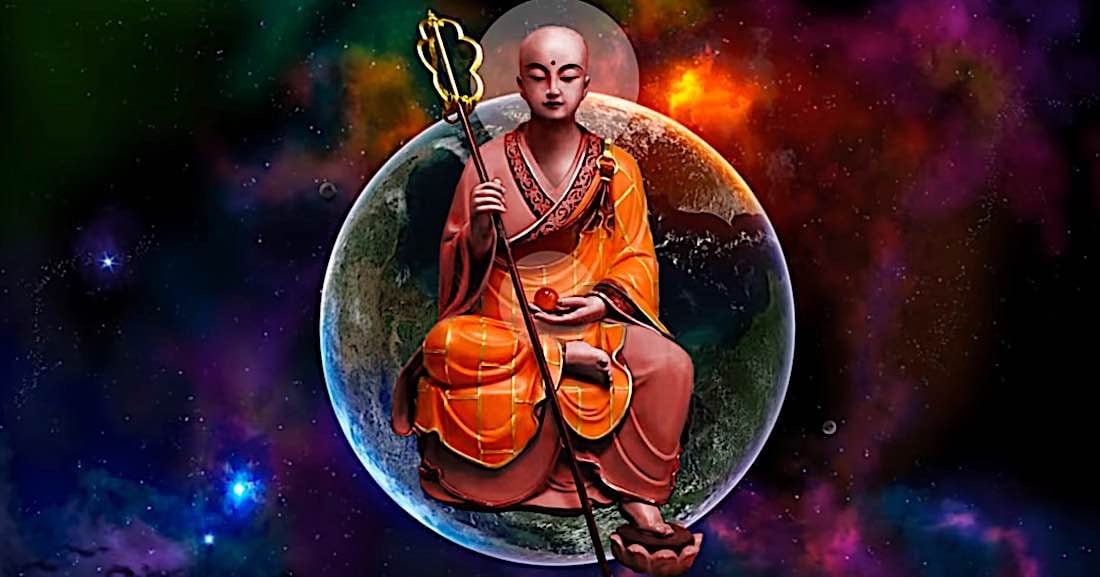
Feeling sad, yet merciful, Prabhacaksuh vowed, “May my mother always be free from the hell realms and commit no serious offenses during or after the 13th year of her present lifetime, and may she never again experience any evil path, whatsoever.”
Then, in front of an image of the Buddha, Prabhacaksuh made the bodhisattva vow,
“From this day forth, and for millions of eons to come, I will liberate and deliver all sinful, suffering beings in all worlds, in all hells, and on the three evil paths. I will help them leave the paths of hell-dwellers, animals, and hungry ghosts. Only after all beings subject to retribution for sins have achieved Buddhahood, may I myself attain complete enlightenment.”
These events took place long ago. The arhat who helped Prabhacaksuh is now Aksayamati Bodhisattva[16], Prabhacaksuh’s mother is now Moksa Bodhisattva[17], and Prabhacaksuh, is now Ksitigarbha Bodhisattva.
From the magnitude of Ksitigarbha’s vows, we can get a sense of his unfatiguing mercy. The vows and deeds of Ksitigarbha Bodhisattva have been praised by gods, bodhisattvas, and the Shakyamuni Buddha. Since Ksitigarbha Bodhisattva has been working for eons to establish convenient methods for our deliverance, and the Buddha himself has encouraged us praise him, shouldn’t we take the time to learn about this most excellent bodhisattva?
Extensive mantra of Kshitigarbha (anyone can benefit from chanting):
Names of Kshitigarbha
- क्षितिगर्भ, Kṣitigarbha
-
Tibetan:ས་ཡི་སྙིང་པོ་, Wylie: sa yi snying po, THL: Sa Yi Nyingpo
- 地藏菩薩 地藏菩萨, (Pinyin: Dìzàng Púsà)
- 地蔵菩薩 ( じぞうぼさつ ), (romaji: Jizō Bosatsu)
- 지장보살, (RR: Jijang Bosal)
- Mongolian: Сайенинбу
-
Thai:พระกษิติครรภโพธิสัตว์, Phra Kasiti Khappha Phothisat
-
Vietnamese:Địa Tạng Vương Bồ tát
Bibliography
Siksananda. The Sutra of Bodhisattva Ksitigarbha’s Fundamental Vows. English Translation by Tao-tsi Shih. Buddha Educational Foundation, 2000.
NOTES
[1] Kṣitigarbha Bodhisattva Pūrvapraṇidhāna Sūtra, 地藏菩薩本願經
[2] 師子奮迅具足萬行如來, Lion’s Excitement Myriad Deed All Accomplished Tathagata
[3] six paths: existence as a human, god, demi-god, animal, hell, and hungry ghost
[4] samsara, the wheel of existence.
[5] 覺華定自在王如來,Enlightenment Flower Serenity Self Sovereignty King Tathagata
[6] Buddha, Dharma, Sangha
[7] 夜叉, Yaksa
[8] 無毒鬼王
[9] 大鐵圍山, Iron Enclosed Mountain.
[10] 財首菩薩
[11] 一切智成就如來
[12] Could refer to the 10 virtuous deeds of body, speech and mind; or possibly the 10 paramitas.
[13] 清淨蓮華目如來, Pure Lotus Eye Tathagata
[14] 光目, Bright Eyes
[15] Referring to the three lower realms: hell, animal, and hungry ghost
[16] 無盡意菩薩
[17] 解脫菩薩
More articles by this author

Four heroic incarnations of Ksitigarbha, the “Earth Store” Bodhisattva — unfailing, never-tiring compassion

The Three Svabhāva and The Five Dharmas: important core concepts from the Laṅkāvātara Sutra — full English Sutra at end of commentary
Search
Latest Features
Please support the "Spread the Dharma" mission as one of our heroic Dharma Supporting Members, or with a one-time donation.
Please Help Support the “Spread the Dharma” Mission!

Be a part of the noble mission as a supporting member or a patron, or a volunteer contributor of content.
The power of Dharma to help sentient beings, in part, lies in ensuring access to Buddha’s precious Dharma — the mission of Buddha Weekly. We can’t do it without you!
A non-profit association since 2007, Buddha Weekly published many feature articles, videos, and, podcasts. Please consider supporting the mission to preserve and “Spread the Dharma." Your support as either a patron or a supporting member helps defray the high costs of producing quality Dharma content. Thank you! Learn more here, or become one of our super karma heroes on Patreon.
Eddie Sobenes
Author | Buddha Weekly
Eddie Sobenes is a high school English teacher. He is interested in Mahayana sutras, education, and music composition.
Website
www.sites.google.com/site/sobenesmusic




